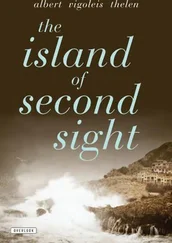Of course, summers were not just for play. During the sixth month in the lunar calendar, we harvested barley and dried it in the courtyard between the big and little houses. We helped Mother slaughter a rooster in a special ceremony; then we cooked it and served it to Grandmother so she would remain free of old-age illnesses. We learned how to mix ashes with seaweed to make fertilizer, which we carried to our field. We planted buckwheat, and weeded, weeded, weeded. And always, around 7.7 in the lunar calendar and August in the Western calendar, we made gal-ot, a special kind of cloth dyed in unripe persimmon juice. The tannin from the fruit prevented the cloth from holding odors or giving off sour smells, which meant we could wear it for days and weeks at a time without it stinking. It was also water resistant and worked as a mosquito repellent. Barley bristle didn’t stick to this type of cloth, and, because the persimmon juice strengthened it, our clothes didn’t rip, not even when we brushed against thorns. We used gal-ot for everything. Even Mi-ja, who’d outgrown her fancy city clothes, wore trousers, shirts, and jackets made from it. My clothes were passed down to my brothers and sister, but Mi-ja saved hers. “When I have children,” she said, “I’ll use the softened cloth for blankets and diapers.” The thought had not yet occurred to me that I might have a baby one day.
Every fall, Grandmother Seolmundae’s slopes were aflame with leaves in yellow, orange, and red. At this time of year, Mi-ja and I liked to climb oreum, the smaller parasitic cones Grandmother Seolmundae had given birth to when she erupted. We’d sit together—walled-in fields spreading out below us like a quilt, the sky cloudless, the ocean glittering in the distance, the taller oreum topped by ancient watchtowers, where beacon fires once warned islanders of approaching pirates. We’d talk and talk and talk. I loved hearing about Jeju City. To me, every story seemed more fantastic than the last.
One day she mentioned that Jeju City had electricity. When I admitted that I didn’t know what that was, she laughed. “It lights up the room without burning pinesap or oil. There are lights on the streets. Colored bulbs brighten shop windows. It’s…” The space between her eyebrows creased as she thought about how best to describe the intangible to me. “It’s Japanese!”
Mi-ja and her father had also owned a radio. She said it was a box with voices coming out of it, made in Japan. I couldn’t imagine that either. And it confused me to think that the cloven-footed ones could have so many marvelous creations.
She talked about her father’s car— car! —and how he drove all over the island on roads that the Japanese had built, when all I had ever seen were pony-pulled carts and the occasional truck that came to our village to pick up haenyeo for leaving-home water-work in other countries. “Father managed road construction crews for the Japanese,” Mi-ja explained. “With his help, they connected the four parts of the island for the first time!”
All I knew was Hado.
“My father was well respected,” she told me. “He loved me. He took care of me. He bought me toys and pretty clothes.”
“And he fed you.” I egged her on, because I loved to hear about all the dishes she’d eaten that I’d never tasted—buckwheat noodles with pheasant or spiced and grilled horsemeat from the mid-mountain area. To a little girl who had only tasted pig meat and sea creatures, it all sounded preposterous but delicious. And then there was sugar…
“Imagine eating something that makes you smile so hard your face aches. That’s what it’s like to eat candy, ice cream, and pastries, or wagashi and anmitsu .”
But when would I ever have a Western or Japanese dessert? Never.
In Jeju City, Mi-ja had “playmates,” which were another thing I could not comprehend, not even when she described tag and hide and go seek. Who had interest in games that weren’t teaching you something practical like how to dive for top shell or gather seaweed? It was hard to imagine, as well, living in a house with its own attached garden with fruit trees and a pond in which the servants raised fish for the household, making it an impossibility that Mi-ja could ever go hungry.
Mi-ja was aware of all she’d lost, so while talking about her past was fun for me, sometimes it made her feel low. That’s when I would suggest she bring out her father’s book. We’d sit side by side, turning the pages. It was a manual that her father had used in his travels around the island. In the beginning, Mi-ja could still remember the meaning of a character here and there— oil, east, road, mountain, bridge —but as the months passed, with no one to remind her, her ability to read waned. Still, there was something mysterious, magical even, about the characters on the page, and she liked to run a finger down a vertical line and “read” to me stories of goddesses and mothers that she made up.
The saying You aren’t aware your clothes are getting wet in the rain suggests a gradual change and can be interpreted in two ways, one positive, the other negative. A positive story might involve friendship, which grows over time. First you are acquaintances, then friends, then a closer relationship develops, until you realize that you love each other. A darker example might be about a criminal. A person steals a small thing, then a larger thing, until finally he’s become a thief. The point is, you’re not aware just how wet you’re getting when the drizzle starts. Unlike most people, though, Mi-ja and I had physical proof that we were growing closer, because, as she had said on that first day, we were capturing moments with our rubbings. As precious as her father’s book was to her, she was never shy about ripping out one of the pages so we could make a rubbing together. One of us would hold the piece of paper and the other would rub the lump of coal over it so we could capture the ridged outline of a shell won in a swimming contest, the pattern of the wooden door to my house the first time she was allowed to spend the night, the surface of her first tewak, which Mother made for her, as though she were an actual daughter.
_____
When we turned nine, the haenyeo of Hado helped plan an island-wide anti-Japanese demonstration. Mother had started attending the Hado Night School. As far as I could tell, she didn’t acquire much in the way of reading or writing, but she and her friends learned how to weigh their catches so they wouldn’t be cheated. She also learned about her rights. Inspired by a young male teacher—an intellectual and a leftist, Mother called him—a group of five haenyeo banded together to fight against rules that were being forced upon women divers by the Japanese. My mother wasn’t part of that core group, but she repeated what she’d picked up from them.
“The Japanese don’t pay us a fair price. They take too high a percentage for themselves. Forty percent! How are we supposed to live with that? And some of their officials—collaborators—sneak our harvest of agar-agar through Jeju City’s port for their own gain.”
Collaborators. Mi-ja shrunk into herself, pulling her shoulders up around her ears. Mother put a hand on the nape of Mi-ja’s neck to reassure her.
“Resist,” she went on. “We have to resist.”
News passed from one woman’s mouth to another woman’s ear, from one collective to the next, all around the island. Hearing so many complaints, the Japanese said they would make changes.
“Except they lied to us!” Mother spat out. “Months have gone by—”
Grandmother, who hated the Japanese more than anyone I knew, warned, “You must be careful.”
But it was too late for that, because a plan had already been set. On a morning when the village of Sehwa held its five-day market, the haenyeo from Hado would march to the market, where they would gather even more haenyeo. From there, they would continue on to the district office in Pyeongdae to present their demands. Everyone was excited but nervous too, because no one could guess how the Japanese would respond.
Читать дальше












